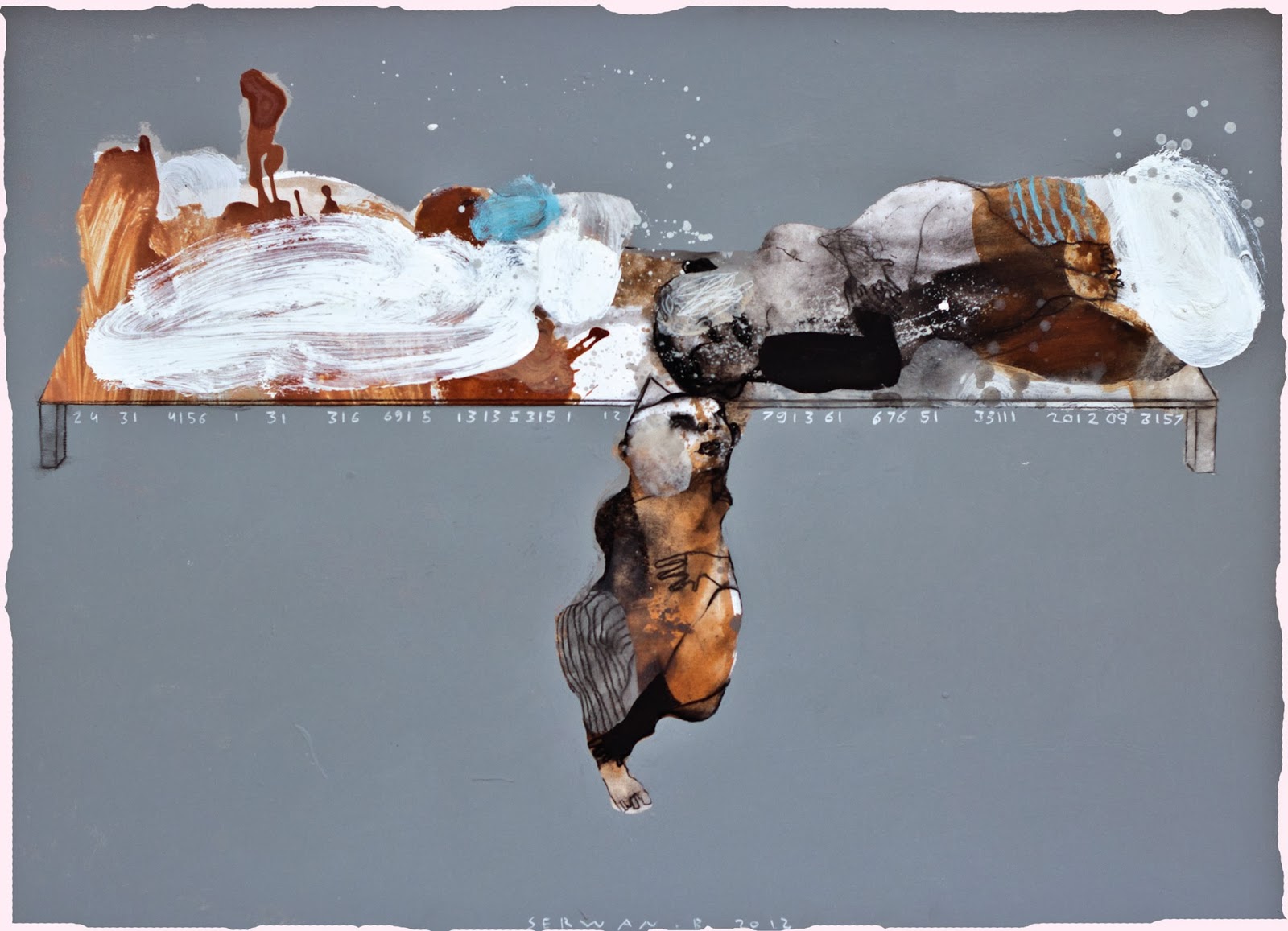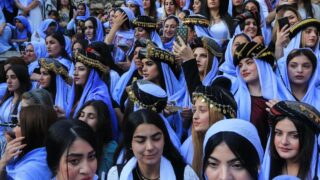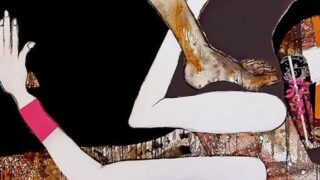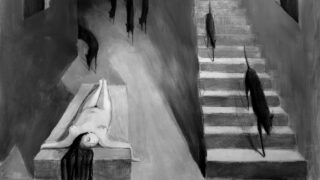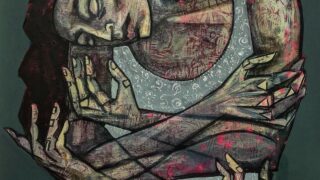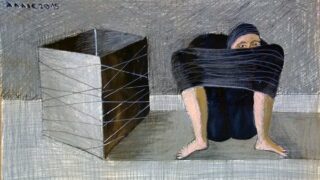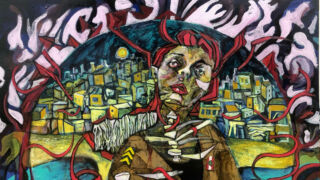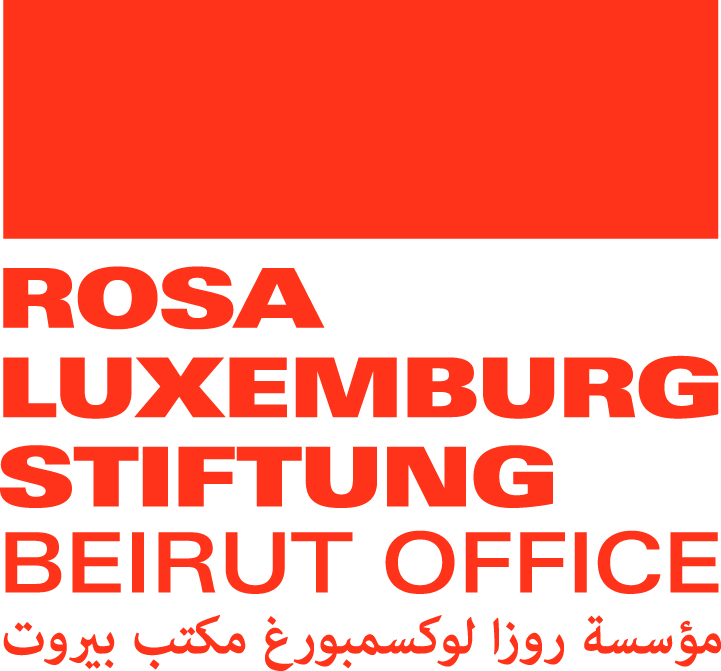
This publication has benefited from the support of the Rosa Luxemburg Foundation. This text may be reproduced in part or in full, provided the source is acknowledged.
I belong to the generation of loss, a generation of shattered dreams and innocent, unfulfilled love stories. We were born in the seventies and came of age during the eight-year-long Iran-Iraq war. Our youth was marked by the grave sight of black banners, bearing the names of those who had been killed at war, hanging on the walls of homes in our neighborhoods. On our way back from school, we often quenched our thirst with berries and buckthorn from the towering trees that shaded the city's streets, and drank cold water from the communal fountains people built in front of their homes, so passersby could have a drink and offer their prayers to the souls lost in the senseless conflict.
I belong to the generation that celebrated the war's conclusion in the summer of 1988. For three consecutive days, the streets teemed with Iraqis singing and dancing in response to the ceasefire announcement. We joyfully splashed each other with water on the streets of Baghdad, reviving an ancient Assyrian celebratory tradition. We were a group of strangers brought together by the shared hardships of war and eight long years of closed borders, which had turned Iraq into one giant prison for millions of us.
Our joy was fleeting, however, and our celebration was cut short by the ominous return of the war drums. Instead of joyful water splashes in the streets, our country was engulfed in a torrent of bloodshed, just six days shy of the second anniversary of the war's end. Under Saddam Hussein's command, the Iraqi army was dispatched to occupy Kuwait. When the people of Iraq revolted, they were met with ruthless brutality, with many executed and even buried alive. Eventually, the Iraqi army withdrew from Kuwait, only to face an orchestrated attack by international coalition forces, resulting in massacring its soldiers and destroying its military vehicles on the infamous Highway of Death.
Our lives were given names straight out of a Hollywood script: “The Desert Storm,” “shock and awe,” “the mother of battles,” “The First Gulf War,” “economic sanctions,” and various others. As if all that had befallen us could be neatly summed up in an attractive label to vindicate our spilled blood and our stolen future.
I belong to the generation of escape - those forcibly torn away from their homeland, driven by the desperate hope of escaping hunger during the days of the embargo.
We packed our bags with things that were “light in weight and precious in value,” boarded buses and cars, and set out toward Jordan. This was the only crossing point open to Iraqis, after the rest of the world had shut its doors and windows in our faces. I can still vividly recall the image of houses and palm trees gradually receding from my view until they vanished entirely on the horizon.
I remember my mother's words as she cautioned us to keep silent and answer any questions we might be asked with brief phrases that would not divulge any information about the gold jewelry we had hidden in our clothes. My mother had painstakingly sewn these valuables into the folds of our clothing so we could smuggle them out of Iraq's borders. Our government had imposed strict restrictions on transporting “valuable private possessions,” leaving us no choice but to smuggle them to avoid destitution in a foreign land.
At the Iraqi border, a group of men of various ages, stood in a single endless queue, wearing only their undergarments. Meanwhile, within the women's inspection room, a female inspector subjected us to an invasive examination. When we reached the Jordanian border, the unsettling scenario was repeated—a long line of half-naked men and a designated room for women, where the inspector groped our breasts and patted our inner thighs, in search for our hidden gems.
Our lives were given names straight out of a Hollywood script: “The Desert Storm,” “shock and awe,” “the mother of battles,” “The First Gulf War,” “economic sanctions,” and various other titles. As if all that had befallen us could be neatly summed up in an attractive label to vindicate our spilled blood and our stolen future.
It was the beginning of our somber tale… Or, was it the end? It was the story of an entire generation of Iraqi children, women, and men born into a world where the specter of war seemed to be lurking, waiting down every street and around every corner. One war would end, only for another to begin. We were teenagers, or on the brink of our twenties, witnessing a deep kind of sorrow in our parents’ eyes and their anxious fear for us and our fate in foreign lands where they knew and had no one. We suddenly became a heavy burden on them, particularly the girls among us, who turned into a generation of diasporic brides. Almost overnight, our fathers and mothers assumed the role of matchmakers, diligently seeking out a “suitable match” for their daughters. In that time and place, “a suitable match” was often defined by the potential groom’s passport and country of residence. Those men who had managed to flee the hellscapes of their homeland became highly sought after, as they represented the perfect escape from the war-torn land to the safety of a brighter future.
This marked the dawn of the so-called “salon marriage.” Interestingly, even though many of the parents of that generation had married for love and had beautiful romantic stories to tell their children, they were the ones who inadvertently propelled this phenomenon of arranged marriages. They would show their sons and daughters colorful pictures of potential partners, as if marriage were just an insurance policy for the future. Needless to say, many of these marriages ultimately ended in divorce.
I belong to a generation of migrants who never returned. We left our homeland, which had been engulfed by war, while those who stayed behind became wood for the fires of conflict. We carried our diasporic dreams to faraway lands and spoke in unfamiliar tongues that we labored to master. We lived in alienating environments, the kindest of which took advantage of our need for stability. We needed a roof, so landlords hiked rent prices. Many made us feel like "thieves" who had stolen the jobs, livelihoods, and tax money of the “real citizens.” On our TV screens, we watched the occupation and destruction of our homeland unfold in real-time. We were in a state of confusion, shaken to our very core. Perhaps everything that was happening was a "logical" outcome of the wars and crises we had witnessed, but we couldn’t help but wonder how this spiral of decay could continue to grow deeper and darker with each passing day.
Our eyes, their sleep long forgotten, remained hopelessly fixed on TV screens that couldn’t capture the depth of our memories and knowledge of the cities that were part of us. These cities had been transformed into cinematic landscapes of fire, smoke, and raining bombs, erasing every last trace of our existence: our footprints, our fingerprints, our breaths... Ironically, at the time, I was working for an American university in an Arab country. Just a few days before Baghdad fell, we, Iraqi personnel and students, were organizing protest groups against the occupation, fully aware that our efforts represented a mere moral stand that could not change an inevitable reality.
“Death among your kin is more merciful that death alone,” we used to say in Iraq, and I was looking for mercy. I found a large group of people gathered around a big TV screen in the cafeteria, where silence and tension filled the air. Between his hurried, panting breaths, the news correspondent repeatedly mentioned Baghdad’s name.
My mind fell quiet. I couldn’t even think of my extended family, my friends, and our home back in Iraq. All I could imagine at that moment were the mulberries, buckthorns, and palm trees. It was as if all my memories of Iraq were contained in these things.
The occupying forces were advancing into Iraqi territory, steadily approaching the capital. For non-Iraqis, the clips on the news must have looked like scenes from an exciting new video game or an enthralling war series that had everyone hooked. People were making expectations, bets, and promises that Baghdad would not fall. Baghdad was at the center of all attention, almost as if the rest of Iraq falling under the US occupation was normal. We heard, over and over again, the phrases “Baghdad will resist! They will never set foot in Baghdad. Those “oulouj” will never conquer Baghdad!”… “Oulouj ,” a mysterious term that meant something like “uncivilized mercenaries,” was coined by the then Iraqi Minister of Foreign Affairs, Muhammad Saeed al-Sahhaf, to describe the US forces. The world mused and puzzled over the origins of the word, while some believed al-Sahhaf’s narratives, as he insisted, while clad in his military uniform and projecting unwavering confidence, that US tanks had not even reached the outskirts of Baghdad.
In his military uniform, Iraqi President Saddam Hussein made a public appearance on a Baghdad street and was warmly greeted with cheers and chants by people who gathered around him. Those of us who acquainted with the state’s TV channel and the President's street tours were accustomed to these staged appearances, in which the President would appear to generously offer his blessing and charitable contributions to his people, while they lived in silence and subservience, completely convinced that “the walls had ears.” Most of us knew, however, that the person walking the street in the leaked video was, in fact, Saddam Hussein’ “stand-in,” a lookalike who filled in for the “original” President, who had survived numerous assassination attempts.
When I heard that the US forces had entered Baghdad, I quickly retreated to my university office and shut the door. It felt as though I had been plunged into a bottomless, dark whirlwind. The air weighed down on my chest like a heavy boulder and my brain shut down, unable to process what sort of twisted logic justified all this injustice. Hadn't the world already seen enough of our spilled blood? I dashed from my office as if fleeing from myself, and headed towards the student cafeteria, where fellow Iraqis usually gathered to seek solace in one another’s company.
I searched for those who had survived and discovered a chilling collection of stories of death, displacement, kidnapping, and assassinations. The violent events had taken a toll on everyone. I did not return to Iraq until 2019, 27 years after my departure, and I found myself walking down streets I could no longer recognize. People were protesting against those who had assumed power following the occupation.
Among bewildered faces, I looked for my people, those who would understand the pain weighing down on my chest. “Death among your kin is more merciful than death alone,” we used to say in Iraq, and I was looking for mercy. I found a group of people gathered around a large TV screen in the cafeteria, where silence and tension filled the air. Between his hurried, panting breaths, the news correspondent repeatedly mentioned Baghdad’s name. Or, maybe I was imagining it. The camera then showed the tired and destitute figures of Iraqi citizens, frantically carrying chairs and other items they managed to haul from government buildings and offices, while US army tanks and soldiers stood by, watching the country’s decay.
I sought solace in the few familiar faces in the cafeteria; “a merciful, collective death.” My voice choked as I asked, "What's happening?", to which someone replied with a grim expression, "They’re looting government offices.” I robotically blurted out, "Why?" Among the group was a young Iraqi student who couldn't have been older than 19, and had never set foot in Iraq before. He was one of the most enthusiastic participants in the daily Iraqi gatherings we had set up in the university after the invasion began. His voice was cold and eerily distant as he replied, “Our time has come. Did you think your time would last forever?” Time seemed to stand still in that moment, and I heard my own voice asking, “Who do you mean? Who is “we””?
My mind fell quiet. I couldn’t even think of my extended family, my friends, and our home back in Iraq. All I could imagine at that moment were the mulberries, buckthorns, and palm trees. It was as if all my memories of Iraq were contained in these things alone. The mournful cries of our neighbor in Baghdad who had lost her brother in the Iran-Iraq war, reverberated in my ears. Her weeping laments seeped through my window, which sat across from hers, every day for many years. Sometimes, I saw her quietly seated under the big buckthorn tree in their garden, staring at nothing. I don’t recall ever seeing her shed tears, but her wailing cries filled the neighborhood. People told stories about how news of her twin brother’s passing at the beginning of the war had broken her. She had lost her mind, they said.
“Did you really think your time would last forever?” he said. Who was “we”?
The incessant, wretched wail of the sirens echoed in my ears for years, haunting me each time I entered a dark room or turned off the lights to sleep. For years, I couldn’t eat meat because its smell would bring back harrowing memories of the smell of burnt human flesh that lingered heavy in the air in our neighborhood, after the coalition forces bombed Al-Amiriyah shelter in 1991, cold-bloodedly murdering over 400 innocent civilians. To this day, I can't help but shudder at the sound of fireworks and the sight of smoke, despite my persistent efforts to remind myself that they signify celebration, not death.
It was the beginning of our somber tale… Or, was it the end? It was the story of an entire generation of Iraqi children, women, and men born into a world where the specter of war seemed to be lurking, waiting down every street and around every corner. We were teenagers, or on the brink of our twenties, witnessing a deep kind of sorrow in our parents’ eyes and their anxious fear for us and our fate in foreign lands where they knew and had no one. We suddenly became a heavy burden on them, particularly the girls among us, who turned into a generation of diasporic brides.
I searched for those who had survived the US occupation and discovered a chilling collection of stories of death, displacement, kidnapping, and assassinations. The violent events had taken a toll on everyone. I did not return to Iraq until 2019, 27 years after my departure, and I found myself walking down streets I could no longer recognize. People were protesting against those who had assumed power following the occupation.
It seemed that everyone I had met carried countless tales of loss. They had lost loved ones in the civil war and bombings. On their way to school, they had seen countless lifeless bodies on the sides of the road. Two decades after the occupation, I still don't know who the “we” the young Iraqi man mentioned referred to. What I do know is that, sometimes, I feel that the darkness experienced by my generation pales in comparison to the darkness endured by the generation of the occupation and civil war. To them, we represent a generation that found some kind of salvation. Loss and diaspora, perhaps, were kinder than the “merciful, collective death” in Iraq. The country which was once whole became fragmented and splintered into "us," "you," and "them." Groups begetting groups. Though our indoctrinations may divide us, we all remain undeniably bound together in the same dark vortex, swallowed into its bottomless pit.
The content of this publication is the sole responsibility of Assafir Al-Arabi and Rosa Luxemburg Foundation cannot accept any liability for it.
Translated from Arabic by Sabah Jalloul
Published in Assafir Al-Arabi on 14/09/2023
The folder “Twenty Years since the War on Iraq” is a joint production between Assafir Al-Arabi and Jummar, with the support of the Rosa Luxemburg Foundation.

